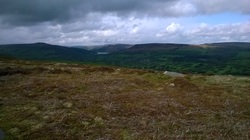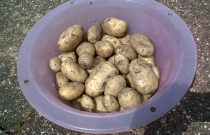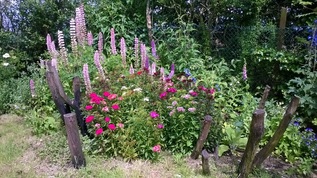
I was reminded of this on reading Johanna Lane’s debut novel, Black Lake. An Indian immigrant might seem worlds away from of a country gentleman in Donegal, yet my ex-boyfriend’s father and Irish patriarch, John Campbell, shared a similar tenacious attachment to their ancestral lands. While one moved thousands of miles away and the other made an uncomfortable compromise to enable him to stay, both their identities were rooted in the soil of their homelands.

This novel made me reflect on my own attachment to soil and landscape. I felt frustrated with John for abandoning his family to go rambling in the hills on the morning the removal men were coming to strip the great house of their possessions. Yet I recognised something of myself in his desperation to get out on his solitary walk: lacing his shoes without socks in his rush to leave without waking his wife. I too have days when it seems that only a walk in the countryside I know and love will restore me to myself. Although, unlike John, I’ve never owned a chunk of the countryside (and, in terms of the battle for the right to roam, we’d have been on different sides), I do sometimes tramp the moors with a proprietorial air.

While the family don’t need Marianne’s garden for food, food security is often at the root of our psychological attachment to land. John is horrified that his ancestor subjected his countrymen to hunger and starvation when he evicted his tenants from their homes. As a former subsistence farmer, my ex-boyfriend’s father understood the value of safeguarding one’s rights to work the land. The allotment movement satisfied a similar need for poor families in Britain in the last century. With a supermarket just down the road, I’m not so dependent on my garden, yet I appreciate the ability to harvest fruit and vegetables from my soil.

There’s a different, but equally disturbing, take on land ownership in The Cutting Season by Attica Locke. Belle Vie is an antebellum plantation between Baton Rouge and New Orleans transformed into a tourist attraction complete with re-enactments and restored slave quarters. The discovery of the dead body of a migrant worker and resulting investigation, both lay and professional, involves revisiting a history that the current owners would prefer to forget.
Not surprisingly, given my interests, a few of my published short stories focus on our attachment to land. Stealing the Show from Nature is the most recent; Plastic was the shortest till now. With Charli’s latest flash fiction prompt on getting stronger, I thought I’d try my hand at something a tad more optimistic. I was surprised where it took me; I’m not sure I approve:
The governor granted his permission, but nothing more. No budget. No staff. When she saw the wasteland he’d assigned her, she almost gave up. Brambles thick as trees. Boulders too heavy for a sole woman to lift.
The prisoners skulked in their cells, smoking. The screws laughed when they unlocked the door to let her out. Laughed when they let her in again, exhausted, caked in mud. Laughed when the slugs gobbled up her seedlings. Yet she and her plants were growing stronger. She smiled. Once she’d harvested the cannabis, there’d be a waiting list for the gardening class.
How attached to you feel to land and landscape? Is this a theme in your writing? What’s your take on the conflict between town and country? Can you recommend any other novels where this attachment to land is addressed?





















 RSS Feed
RSS Feed





















